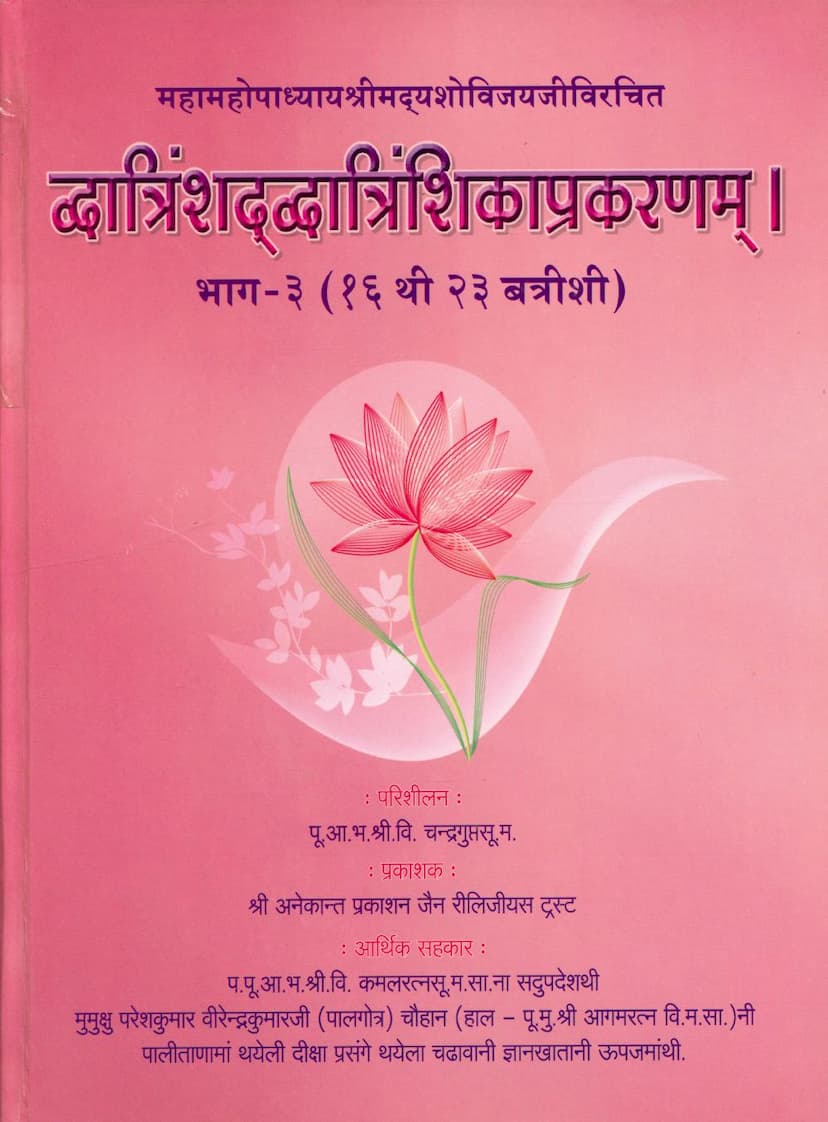Dwatrinshad Dwatrinshika Prakaranam Part 03
Added to library: September 1, 2025

Summary
Here's a comprehensive summary of the provided Jain text, Dwatrinshad Dwatrinshika Prakaranam Part 03 (16th to 23rd 'Batriśī'), authored by Chandraguptasuri and published by Anekant Prakashan Jain Religious Trust. This summary is based on the provided pages, focusing on the content of the 16th 'Batriśī' concerning the "Consideration of Divine Grace" (Īśānugraha Vicāra).
Book Title: Dwatrinshad Dwatrinshika Prakaranam Part 03 (16th to 23rd Batriśī) Author: Chandraguptasuri Publisher: Shri Anekant Prakashan Jain Religious Trust
Overall Context: This volume, specifically focusing on the 16th 'Batriśī' titled "Consideration of Divine Grace" (Īśānugraha Vicāra), by the esteemed scholar Mahamahopadhyaya Shrimad Yashovijayji, presents a critical examination of the concept of divine grace as understood in other philosophical schools, particularly contrasting it with Jain principles. The commentary provided by Ā. Vi. Chandragupta Suri clarifies and elaborates on these points.
Summary of the 16th Batriśī (Īśānugraha Vicāra):
The 16th Batriśī delves into the philosophical debate surrounding divine grace (Īśānugraha), primarily addressing the perspective of the Pātan̄jala school of Yoga.
-
Critique of Pātan̄jala's Concept of Divine Grace:
- The Pātan̄jala school posits that liberation (mokṣa) and yogic perfections are attained through the grace of Mahesh (Īśvara), who is described as a unique being untouched by afflictions, karma, or their consequences. They cite Yoga Sūtra 1.24: "Kleśakarmavipākāśayairaparāmr̥ṣṭaḥ puruṣaviśeṣa īśvaraḥ" (Īśvara is the special puruṣa untouched by afflictions, karma, consequences, and latent tendencies).
- The text thoroughly analyzes the Pātan̄jala concepts of karma āśaya (storehouse of karma), its fruition in birth, lifespan, and experiences, and how even purified karma (śukla and aśukla karma) is discussed in relation to yogis.
- The author of the Batriśī argues that this concept of divine grace is flawed because it relies on an external agent (Mahesh) to bestow liberation. The text refutes the idea that grace alone, without the inherent capacity of the soul (anugrāhya-svabhāva), can lead to liberation. Just as an atom cannot become a soul through divine grace alone, similarly, without the soul's inherent potential, divine grace is insufficient.
-
Jain Perspective on Grace and Self-Effort:
- The Jain perspective, as presented here, emphasizes that while divine guidance through teachings (dharma-upadeśa) is a form of grace, the ultimate liberation is achieved through one's own diligent effort in following the path of right faith, knowledge, and conduct (darśan-jñān-cāritra-maya mokṣa-mārga).
- The text clarifies that the grace of God (Parmātmā) lies in providing the true path and guidance. The soul must then undertake the effort (puruṣārtha) to walk that path.
- The author stresses the importance of understanding how Parmātmā became Parmātmā, the establishment of the liberating path, and the grace bestowed through religious teachings.
-
Rejection of Other Philosophies' Views on God:
- The Batriśī critiques the notion of a creator God or an intervening divine entity as presented in other philosophical systems. It asserts that the concepts of God presented by other schools are either based on flawed reasoning or are unnecessary for achieving liberation.
- The text examines the Pātan̄jala attributes of God like knowledge, detachment, power, and righteousness, finding them to be descriptions of qualities, not a necessarily intervening deity.
- It is argued that if God were the creator and controller of the universe, then liberation would depend solely on divine will, negating individual effort. The Jain view emphasizes that the soul's own efforts, guided by the teachings of the Tirthankaras, lead to liberation.
-
The Nature of Parmātmā and Liberation:
- The text supports the Jain view that Parmātmā is one whose passions (rāgādi kleśas) are completely eradicated. Different names for Parmātmā do not imply any difference in their essence.
- The ultimate attainment is the realization of the soul's pure, unadulterated nature, achieved through devotion to Parmātmā in their unconditioned, pure form.
-
The Role of Japa (Mantra Repetition):
- The text discusses the efficacy of chanting sacred syllables like 'Om' (Praṇava) as mentioned by Patañjali. It suggests that through such devotion, obstacles are removed, and true consciousness (pratyak-caitanya) is attained.
-
Obstacles to Spiritual Progress (Antarāyas):
- The Batriśī elaborates on the nine obstacles (pratyūha) mentioned in Yoga Sūtras, including diseases (vyādhi), lethargy (sthāna), doubt (saṃśaya), carelessness (pramāda), sloth (ālasya), worldly attachment (avirati), false knowledge (bhrāntidarśana), failure to attain the required stage (alabdhabhūmikatva), and instability (anavasthitatva). It further details the nature and causes of these obstacles.
Key Takeaways from the 16th Batriśī:
- Emphasis on Self-Effort: The core message is that while the Tirthankaras provide divine guidance, liberation is primarily achieved through the soul's own determined effort.
- Critique of External Reliance: The text systematically dismantles the idea that divine grace or an external deity is the sole or primary cause of liberation.
- Jain Epistemology: It implicitly highlights the Jain reliance on direct perception (pratyakṣa) and scriptures (āgama) for understanding reality, contrasting it with reliance on mere inference or reasoning which can lead to distortions (kutarka).
- The True Nature of Grace: Divine grace is understood as the provision of the true path and guidance, enabling the soul to achieve its own liberation through diligent practice.
In essence, the 16th Batriśī serves as a philosophical discourse within Jainism, asserting the primacy of self-effort and the soul's inherent potential for liberation, while critically examining and refuting concepts of divine grace that rely on external entities.